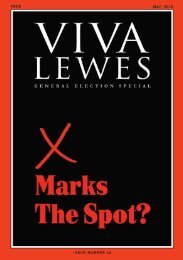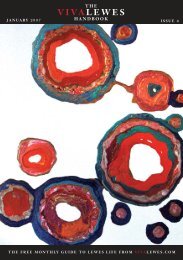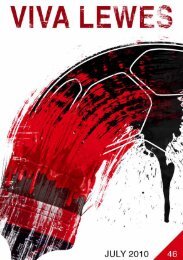Create successful ePaper yourself
Turn your PDF publications into a flip-book with our unique Google optimized e-Paper software.
PETER HENNESSY<br />
Steve Ramsey meets a fairly secret statesman<br />
Clangclangclangclang! I really hope that’s not<br />
a �re alarm. I’m interviewing Professor Lord<br />
Peter Hennessy in �ve minutes. A building<br />
evacuation is the last thing I need, particularly<br />
as the building in question is the Houses of<br />
Parliament, and it would take quite a while.<br />
Fortunately, it’s just the division bell. Lord<br />
Hennessy arrives, and explains that he hasn’t<br />
ever heard the �re alarm. He imagines it must<br />
sound ‘like a banshee’s wail’, to distinguish it<br />
from the horrible tone of the division bell.<br />
We head to his of�ce in the Lords, where I<br />
get out my two dictaphones. One jams almost<br />
instantly. I press the wrong button on the other,<br />
playing Lord Hennessy an excerpt from the<br />
Beatles song Little Piggies, which I’d recorded<br />
earlier to test the machine.<br />
I quickly sort it out, and press on. We have loads<br />
to get through; Hennessy has had his phone<br />
hacked, and spoken to someone who may well<br />
have saved the world. He’s an academic, Orwell<br />
Prize-winning writer, and peer. And he only has<br />
�fteen minutes to spare.<br />
Hennessy hands me a thick book; Anthony<br />
Sampson’s Anatomy of Britain Today. He<br />
received a copy as a sixth form prize in 1965,<br />
and fondly recalls how it, along with Samuel<br />
Brittan’s Treasury Under the Tories, “aroused<br />
an interest which has never been dampened” in<br />
the secret workings of government.<br />
“[Sampson] was an eye opener into a world<br />
that intrigued me, about what really goes on,<br />
in terms of how the country’s run. Not just<br />
government but industry, city, all that...Because<br />
even if you read the newspapers every day, as<br />
I did and have done since 1956 ... you don’t<br />
normally get a sense of what I later called ‘the<br />
hidden wiring’ beneath all this stuff, keeping it<br />
going.”<br />
Before he studied the hidden wiring as an<br />
academic, he wrote about it as a journalist.<br />
Sometimes his stories were based on classi�ed<br />
information leaked by government insiders.<br />
This didn’t please the Home Of�ce, which<br />
would occasionally tap his phone, legally. Hennessy<br />
didn’t mind though: “Quite often I was<br />
warned about this by the people who’d helped<br />
me...and so I wouldn’t use the home phone; I’d<br />
have to �nd a non-vandalised telephone box<br />
somewhere in the vicinity of where I lived. But I<br />
wasn’t bothered; it was all done properly under<br />
Home Of�ce warrants, and as long as I knew, I<br />
never got resentful about it ... It was only when<br />
there was a special leak inquiry going on after<br />
something I’d written.”<br />
This hasn’t happened recently, though. For<br />
his book The Secret State, he waited for the<br />
relevant documents to be made public. Some<br />
“were so sensitive they were kept back longer<br />
than [the standard] 30 years”. This makes the<br />
book “an example of what I call ‘catch-up’ history,<br />
or, more sensationally perhaps, ‘now it can<br />
be told’ history”.<br />
The Secret State describes Whitehall’s preparations<br />
for nuclear war, which were incredibly<br />
detailed. There was even a plan to save Britain’s<br />
most important artworks by moving them to<br />
quarries in North Wales and Wiltshire.<br />
Whitehall may have been worried about nuclear<br />
war, but how much danger were we really in?<br />
“Oh it was very considerable. We were much<br />
more perilously placed at the time of the Cuban<br />
Missile Crisis than we realised at the time. It<br />
came very close indeed. Kennedy ... didn’t know<br />
that on the island of Cuba already were the<br />
warheads for the tactical nuclear missiles, which<br />
would have been used on the American forces if<br />
they’d invaded from the sea, as they landed on












